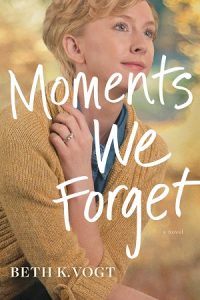Beth K. Vogt believes God’s best often waits behind doors marked Never. Beth is a 2016 Christy Award winner, as well as a 2016 ACFW Carol Award winner and a 2015 RITA Award finalist. Beth’s latest novel is Moments We Forget (Tyndale House), book two in the Thatcher Sisters series.
 An antique walnut Seth Thomas clock hangs on one of the walls in my family room. It used to reside in my parents’ home. Decades before, it hung in a Washington, DC, hotel owned by one of my ancestors. I vaguely recall a rumor of a love triangle and a fire that destroyed the hotel from which the clock was rescued. And yes, the love triangle and the fire were linked.
An antique walnut Seth Thomas clock hangs on one of the walls in my family room. It used to reside in my parents’ home. Decades before, it hung in a Washington, DC, hotel owned by one of my ancestors. I vaguely recall a rumor of a love triangle and a fire that destroyed the hotel from which the clock was rescued. And yes, the love triangle and the fire were linked.
Ah, the unknown stories hidden in our families’ pasts.
I also remember falling asleep to the sound of the ticking of the clock—one of my favorite childhood memories. And so, I was grateful when my father gave me the clock, even though it no longer works. It’s silent now, the brass pendulum still.
Most families have heirlooms—items passed down through generations. Think china or jewelry or furniture or even homes nestled in the mountains or along the shore.
If we’re honest, we’ll admit that not all family heirlooms are welcome ones. We’ve all heard stories, usually told with chagrined laughter, about a garish porcelain dish or mismatched chairs padded in flowered velvet or an abstract painting of who-knows-what that has been in the family for years, not particularly well-liked or wanted by anyone.
But the items stay because, well, they are part of the family history. They belong, even if they are joked about or are barely tolerated. Sometimes these “treasures” are brought out only when a particular relative arrives for the holidays. And so the unwanted inheritances continue their transition from family member to family member.
And then there are the other types of heirlooms. You can’t put a price tag on them. You can’t try to sell them on eBay. You can’t put them out in a garage sale and then bundle them up with the items that didn’t sell. But they are costly. They don’t tarnish, but they do create fractures in the heart of a family. You can’t touch them, but they tangle their poisonous roots deep into a family tree and alter the past, present, and future.
Consider the burdensome heirloom of family secrets. Grievous transgressions committed against one another, mistakes made that are covered up by years of silence and looking away—all for the sake of protecting a family’s name.
What about the cool-to-the-touch heirloom of unforgiveness? Some families have perfected the act of holding a grudge, refusing to forgive each other. Anyone else who hurts a family member? Also unforgiven.
Welcome to the family by birth or marriage, and you’re invited to partake of this heirloom too. This (in)ability is passed down from one family to the next like a sacred trust, not to be broken.
How do we step away from an emotionally unhealthy family heirloom, becoming the one who finally says, “No, thank you” when offered the chance to participate in destructive behavior or choices?
#1 Refuse to accept excuses for unhealthy behavior.
I’m all for family. But I’ve learned to qualify that statement by saying: I’m all for healthy, loving family. Beware this oft-stated belief: “Our family has always been this way.” Those seven little words can be used as an excuse for bad behavior. As family members—grandparents, parents, siblings—we can choose to develop good habits or bad habits when we interact with one another.
We can choose to accuse and blame and then let the emotional turmoil blow over without an apology—and behave badly all over again, year after year—because that’s what family does. Or we can choose to learn how to love and forgive one another in a genuine way that allows for healing and growth.
We need to figure out how not to be tricked into complacency by the long-standing belief of “This is just the way we are,” which implies things will always be the same. We can be the catalyst for change.
#2 Just because something’s been in the family for years doesn’t mean we have to agree to take it.
When we’re offered a family heirloom, we automatically think we have to open our hands and say, “Thank you so much,” don’t we? After all, we don’t want to be rude. We don’t want to hurt someone’s feelings.
But in the end, we can walk away with something we don’t need, don’t have room for, and never wanted. A dozen crystal saltcellars that will sit in our cupboard, never used. A glitzy leopard brooch the size of our fist. A painting that doesn’t fit in our decor. Secrets are often an emotionally unhealthy family heirloom, one that excludes some of the family, while binding others in the cords of “We know something they don’t know.” It’s simple enough to say no if asked, “Can you keep a secret?”
And if our family is founded on generations of secret keepers, we can take a stand for honesty. I’m not suggesting we open every closet and pull out each and every family skeleton hidden inside. But we can choose to be more honest about our own struggles. Our own pain. We can choose to be authentic—not just a buzzword, by the way.
If we’re parenting, we can teach our children it’s okay to make mistakes and that we don’t have to pretend to be perfect. If we’re in relationships, we can confront our struggles and get help. If we’ve helped hide a family secret—alcoholism, perhaps, or abuse—we can decline to be part of those ongoing interactions, even if it means we don’t go to family get-togethers for a while.
#3 Take the time to define what we do value.
My parents knew how much I loved the Seth Thomas clock—how it held special childhood memories for me—and that’s why they gifted it to me. They wanted me to enjoy the clock, to savor the memories. Each of my four siblings also received something special from our family home. The clock was the item I cared about the most.
In the same way, it’s important we know what we value emotionally and spiritually. For me, honesty is important, which has required setting healthy, respectful boundaries with my parents and siblings. My husband and I also value kindness, so cruel and sarcastic humor that attacks another person isn’t tolerated in our home.
My husband’s stepfather was unkind toward one of our daughters when she was younger—verbally cruel—a behavior that had gone on toward others both inside and outside the family for decades. We had to take a stand against his actions to protect our daughter. We declined an emotionally unhealthy—no, an abusive family heirloom that had hurt the family for years for the sake of our child.
Sometimes it’s easy enough to spot an outlandish item that’s been handed down from generation to generation. To decide, “That stuffed owl is going to the thrift store.”
But we can all too easily overlook the harmful family behaviors that damage our hearts and minds—things like bitterness and resentment or emotional or physical abuse. It’s vital to understand how their presence can influence our choices, our actions—and to decide to choose a better way that leads to freedom for us—and for our families in the future.
Visit Beth K. Vogt’s author page:
https://www.familyfiction.com/authors/beth-k-vogt/
 Moments We Forget
Moments We Forget
Thatcher Sisters #2
Beth K. Vogt
Tyndale House
Jillian Thatcher has spent most of her life playing the family peacemaker, caught in the middle between her driven, talented older sister and her younger, spotlight-stealing twin sisters. Then on the night of her engagement party, a cancer diagnosis threatens to once again steal her chance to shine.
Now, Jillian’s on the road to recovery after finally finishing chemo and radiation, but residual effects of the treatment keep her from reclaiming her life as she’d hoped. And just when her dreams might be falling into place, a life-altering revelation from her husband sends her reeling again.
Will Jillian ever achieve her own dreams, or will she always be “just Jillian,” the less-than Thatcher sister? Can she count on her sisters as she tries to step into a stronger place, or are they stuck in their childhood roles forever?


